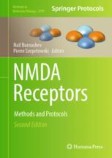Search
Search Results
-
Determination of D-serine and D-alanine Tissue Levels in the Prefrontal Cortex and Hippocampus of Rats After a Single Dose of Sodium Benzoate, a D-Amino Acid Oxidase Inhibitor, with Potential Antipsychotic and Antidepressant Properties
The effects of the N-methyl-D-aspartate receptor activators D-serine, D-alanine, and sarcosine against schizophrenia and depression are promising....

-

-
Effects of Quinolinate-Induced Lesion of the Medial Prefrontal Cortex on Prefrontal and Striatal Concentrations of d-Serine in the Rat
d -Serine has been shown to play an important role in the expression and control of a variety of brain functions by acting as the endogenous coagonist...

-
Silica-coated magnetic nanoparticles activate microglia and induce neurotoxic d-serine secretion
BackgroundNanoparticles have been studied for brain imaging, diagnosis, and drug delivery owing to their versatile properties due to their small...

-
d-Serine produces antidepressant-like effects in mice through suppression of BDNF signaling pathway and regulation of synaptic adaptations in the nucleus accumbens
Objectived -Serine is a crucial endogenous co-agonist of N-methyl- d -aspartate receptors (NMDARs) in the central nervous system and can affect the...

-
Reduced D-Serine Release May Contribute to Impairment of Long-Term Potentiation by Corticosterone in the Perforant Path-Dentate Gyrus
Long-term potentiation (LTP) is a neurobiological mechanism of cognitive function, and the N-methyl-D-aspartate (NMDA) receptors is fundamental for...

-
d-Serine, the Shape-Shifting NMDA Receptor Co-agonist
Shape-shifting, a phenomenon wide-spread in folklore, refers to the ability to physically change from one identity to another, typically from an...
-
Effects of arsenic exposure on d-serine metabolism in the hippocampus of offspring mice at different developmental stages
The main purpose of this study was to verify the hypothesis that cognitive dysfunctions induced by arsenic exposure were related to the changes of d -s...

-
Luvadaxistat: A Novel Potent and Selective d-Amino Acid Oxidase Inhibitor Improves Cognitive and Social Deficits in Rodent Models for Schizophrenia
N-methyl- d -aspartate (NMDA) receptor hypofunctionality is a well-studied hypothesis for schizophrenia pathophysiology, and daily dosing of the NMDA...

-
Selective demethylation of two CpG sites causes postnatal activation of the Dao gene and consequent removal of d-serine within the mouse cerebellum
BackgroundProgrammed epigenetic modifications occurring at early postnatal brain developmental stages may have a long-lasting impact on brain...

-
Spectrum of NMDA Receptor Variants in Neurodevelopmental Disorders and Epilepsy
N-methyl-D-aspartate receptors (NMDAR) are ligand-gated ion channels mediating excitatory neurotransmission and are important for normal brain...
-
Class D Type Beta-Lactamases
Among various β-lactam hydrolyzing enzymes, classified from group A to D, the most genetically as well as biochemically diverse is the class D...
-
Synthesis of alamandine glycoside analogs as new drug candidates to antagonize the MrgD receptor for pain relief
Two series of putatively brain-penetrant alamandine glycosides have been prepared for screening against the MrgD receptor. The first series retains...

-
L-Serine Treatment is Associated with Improvements in Behavior, EEG, and Seizure Frequency in Individuals with GRIN-Related Disorders Due to Null Variants
Pathogenic missense variants in GRIN2A and GRIN2B may result in gain or loss of function (GoF/LoF) of the N-methyl-D-aspartate receptor (NMDAR). This...
-
Major Psychiatric Disorders
Glial and immune cells are involved to various degrees in initiation and progression of mental diseases. However, one must judge each disease...
-
New molecular mechanisms in cholangiocarcinoma: signals triggering interleukin-6 production in tumor cells and KRAS co-opted epigenetic mediators driving metabolic reprogramming
BackgroundCholangiocarcinoma (CCA) is still a deadly tumour. Histological and molecular aspects of thioacetamide (TAA)-induced intrahepatic CCA...

-
Cognitive enhancing effects of pazopanib in D‑galactose/ovariectomized Alzheimer’s rat model: insights into the role of RIPK1/RIPK3/MLKL necroptosis signaling pathway
Necroptosis, a programmed form of necrotic cell death carried out by receptor-interacting serine/threonine protein kinase 1 (RIPK1) and RIPK3, has...

-
Limb-Clas** Response in NMDA Receptor Palmitoylation-Deficient Mice
Proper regulation of N -methyl- d -aspartate-type glutamate receptor (NMDA receptor) expression is responsible for excitatory synaptic functions in the...

-
Gastric Epithelial Barrier Disruption, Inflammation and Oncogenic Signal Transduction by Helicobacter pylori
Helicobacter pylori exemplifies one of the most favourable bacterial pathogens worldwide. The bacterium colonizes the gastric mucosa in about half of...
-
β-Lactamase Inhibitor Combinations Targeting Antibiotic Resistance in Gram-Negative Bacteria
Antibiotic resistance induced by β-lactamase is posing a significant problem to the pharmaceutical industry. For the last 30 years, only a few...
